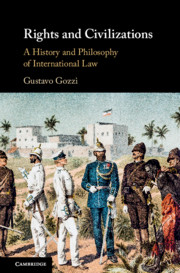Book contents
- Rights and Civilizations
- Rights and Civilizations
- Copyright page
- Dedication
- Contents
- Preface to This English Translation
- Introduction: The West and the Law of Peoples
- Acknowledgments
- A Note on the Contents
- Part I Ius Gentium and the Origins of International Law
- 1 The Rights of Peoples and Ius Gentium: Their Origins in the Modern Age
- 2 Hugo Grotius and the Law of Peoples
- 3 Samuel Pufendorf and Emer de Vattel: Kant’s “Miserable Comforters”
- 4 The Rights of Man and Cosmopolitan Law: Kantian Roots in the Current Debate on Rights
- Part II International Law and Western Civilization
- Part III International Law, Islam, and the Third World
- Part IV Conditions for Peace
- Glossary of Arab Terms
- Index
3 - Samuel Pufendorf and Emer de Vattel: Kant’s “Miserable Comforters”
from Part I - Ius Gentium and the Origins of International Law
Published online by Cambridge University Press: 11 February 2019
- Rights and Civilizations
- Rights and Civilizations
- Copyright page
- Dedication
- Contents
- Preface to This English Translation
- Introduction: The West and the Law of Peoples
- Acknowledgments
- A Note on the Contents
- Part I Ius Gentium and the Origins of International Law
- 1 The Rights of Peoples and Ius Gentium: Their Origins in the Modern Age
- 2 Hugo Grotius and the Law of Peoples
- 3 Samuel Pufendorf and Emer de Vattel: Kant’s “Miserable Comforters”
- 4 The Rights of Man and Cosmopolitan Law: Kantian Roots in the Current Debate on Rights
- Part II International Law and Western Civilization
- Part III International Law, Islam, and the Third World
- Part IV Conditions for Peace
- Glossary of Arab Terms
- Index
Summary
- Type
- Chapter
- Information
- Rights and CivilizationsA History and Philosophy of International Law, pp. 52 - 71Publisher: Cambridge University PressPrint publication year: 2019



